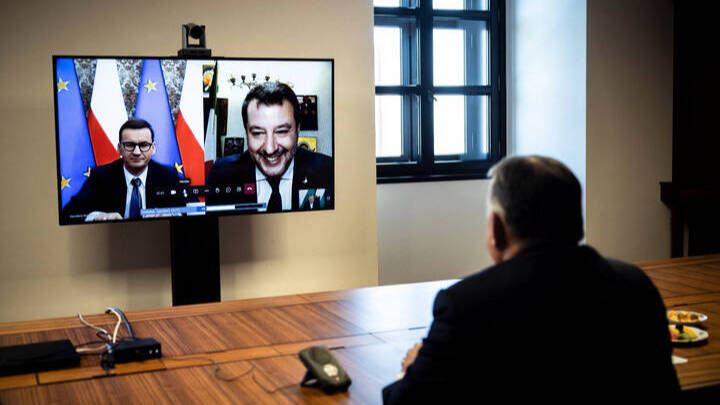By Álvaro Peñas and José Papparelli
In recent weeks, surprising news has been circulating, to say the least, of a possible rapprochement between Matteo Salvini’s La Lega and the European People’s Party. Power softens convictions and the presence of La Lega in Mario Draghi’s government seems to have seduced some party leaders into “moderation”. Last Wednesday, Giancarlo Giorgetti, minister for economic development, deputy federal secretary of La Lega and the party’s number two, called for a European turn during an interview with Bruno Vespa on “Porta a Porta”, the highest-rated political programme on Italian television. This “European turn” would mean nothing less than a move away from the sovereigntists, the demonised Hungarians and Poles, and a rapprochement with the politically correct positions of the European People’s Party.
The next day, La Lega held an extraordinary meeting in which Matteo Salvini reaffirmed his commitment to the conservative and patriotic right, and flatly rejected any possible rapprochement with the European People’s Party, a party that, according to Salvini, is completely left-leaning and defends the same policies as the socialists: “It is unthinkable to join the EPP because it has subordinated itself to the left”. A political shift that has meant that the EPP “has never been so weak”. After the meeting, Giorgetti gave his full support to Salvini, giving the impression that the issue was settled. Nevertheless, Salvini called for a national conference on 11-12 December to define the long-term direction of the party.
But official statements are one thing and reality is another, and it seems clear that the “moderate” sector of La Lega does not consider the issue resolved. This is the only way to explain Matteo Salvini’s blunt reaction last Saturday, during the day of the Political Training School: “They tell me: ‘You have to join the People’s Party’. Let’s see… I go in wherever the f**k I want. Do I go in, do I go out, do I touch the phone, like trick-or-treaters at Halloween? But do I get to decide? If the centre-right in Italy and in Europe is enslaved by the left, my task is not to execute what they want, but to create an alternative and make the centre-right proud of itself again. Conservative, liberal (*), revolutionary and constructive. And in this my relationship with Silvio Berlusconi and Giorgia Meloni will always be the most important thing”. A necessary mention of his allies with whom, despite the setback of the municipal elections, he continues to win a majority in all the polls for the general elections.
Salvini is very clear about the direction La Lega should take and, at the beginning of last week, he met by videoconference with the Hungarian prime minister, Viktor Orbán, and the Polish prime minister, Mateusz Morawiecki. The meeting was part of talks on the formation of a new European political grouping capable of bringing together European conservative and patriotic forces. A new formation that has begun to take shape with the declaration on the future of Europe signed in July by parties such as Marine Le Pen’s National Rally, VOX, Fratelli d’Italia and the Austrian FPÖ. In other words, with parties belonging to the European groups Identity and Democracy (ID) and European Conservatives and Reformists (ECR), to which Fidesz, which left the EPP, is added, and which in the future could incorporate other conservative parties from Central and Eastern Europe that are currently in the EPP, but which do not share the progressive enthusiasm of their Western counterparts. A group that could stand up to the EU’s globalist and anti-national policies and, above all, could do a lot of damage to the socialists’ proxy team, the European People’s Party. As Viktor Orban pointed out in April, millions of Europeans have been left without adequate and effective political representation in Europe following the People’s compromise with the left.
The latest voice to join the debate was that of Lorenzo Fontana, MEP for La Lega and one of the organisation’s key figures, who was interviewed by “La Verità” on Monday: “La Lega does not have to please the system. Lega means courage to work, even with those who do not like the mainstream media, such as Hungary and Poland, to build another Europe, one that belongs to the people”. Fontana, who defines himself as “identitarian”, strongly supported Salvini’s position: “The Lega is not a centrist party”.
It is clear that the Lega suffers from an internal division on ideological and strategic issues. In this sense, the figure and role of its Matteo Salvini will be decisive not only for Italian politics but also for European politics. Events and time will tell how this “rebellion of the moderates” will end, but what is certain is that La Lega has lost strength and popular support as a result of its inclusion in Draghi’s government and that a shift to the centre only favours the supporters of Brussels and its globalist policies. These “party crises” and those that will undoubtedly arise in the coming years make the unity of European patriots advocated by Orbán, Salvini and Morawiecki all the more urgent.
(*) In Italy, the liberal political concept refers to the safeguarding of citizens’ freedoms and rights against state interference in general, and not to laissez-faire or the “invisible hand that self-regulates the market”, an economic concept known as libertarianism.)

